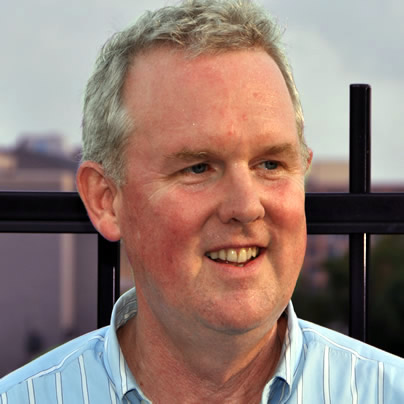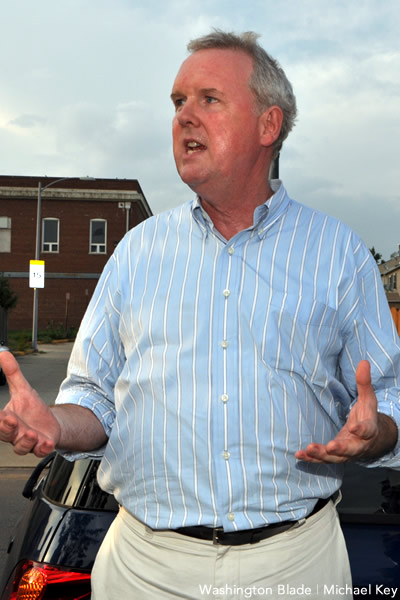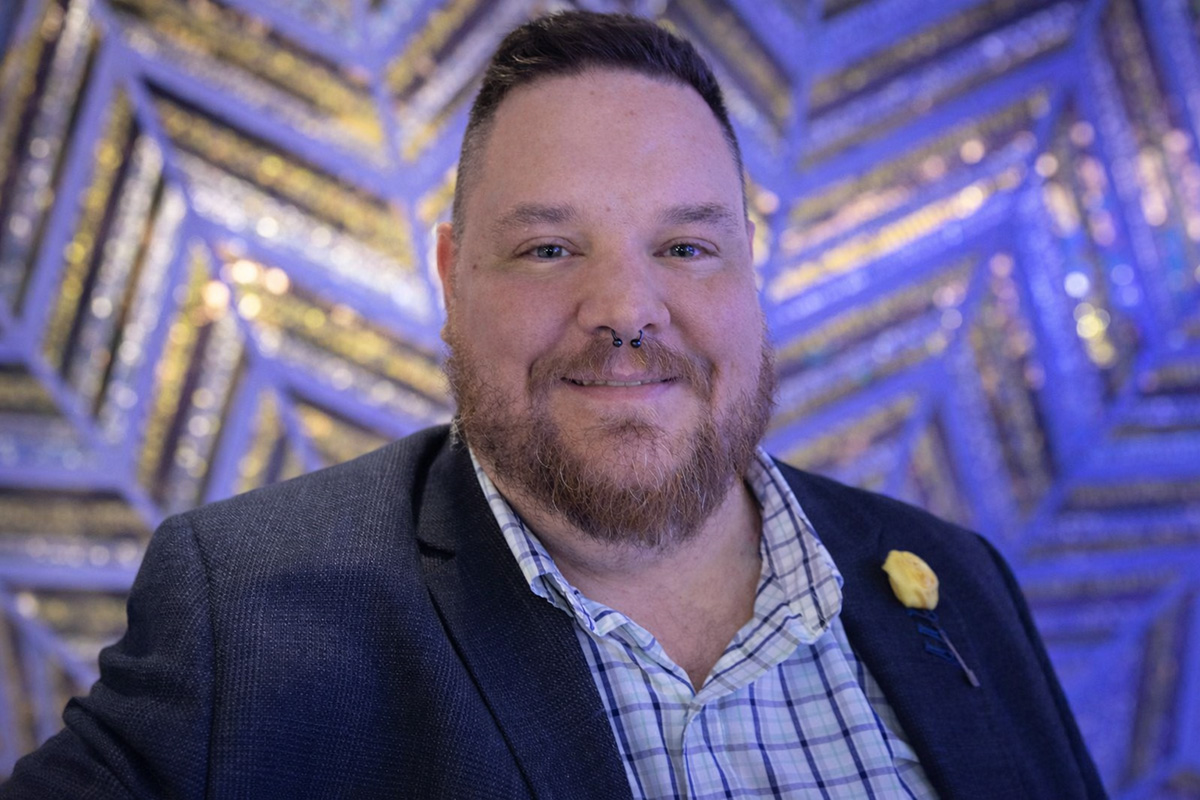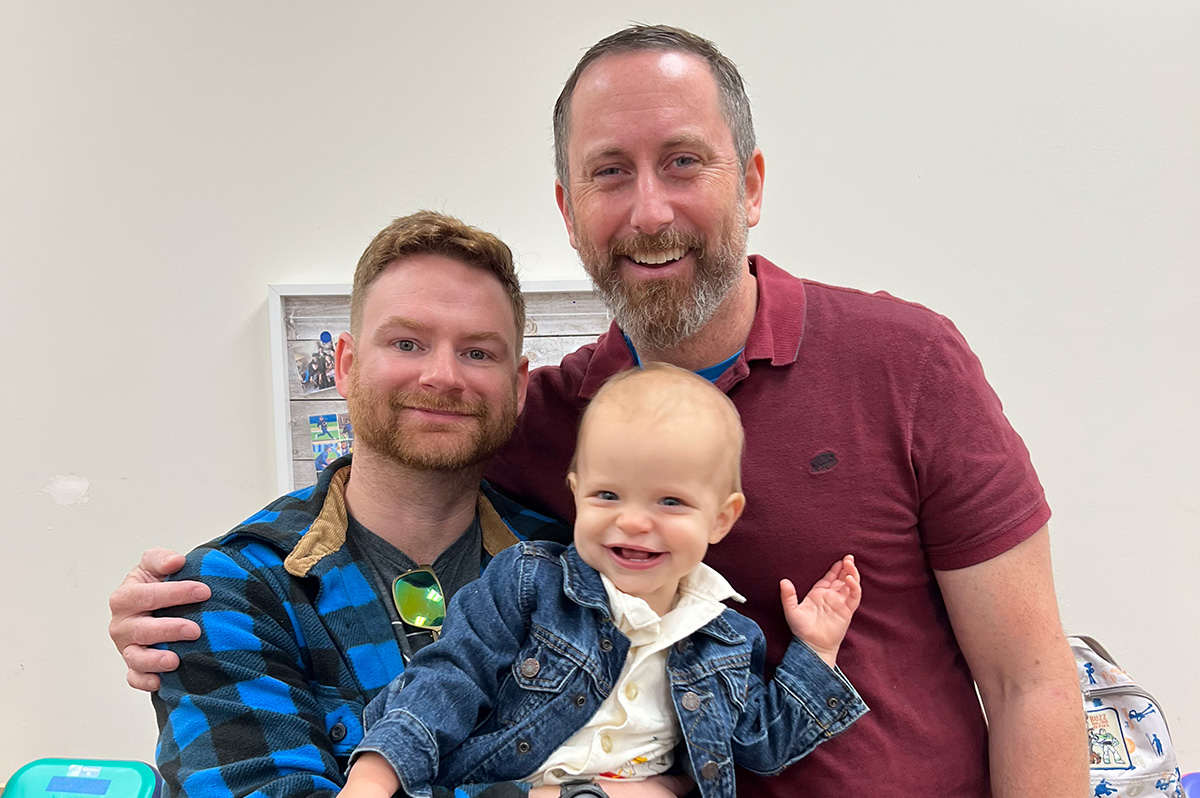Local
D.C. anti-bullying bill clears key vote
Training requirement eliminated to cut cost of measure


‘The bill delivers a strong message that this city will not tolerate bullying – especially for our LGBT youth,’ said Council member Tommy Wells. (Washington Blade photo by Michael Key)
A D.C. Council committee voted unanimously on April 20 to approve the Youth Bullying Prevention Act of 2012 and to send it to the full Council for an expected preliminary vote on May 1.
“The bill delivers a strong message that this city will not tolerate bullying – especially for our LGBT youth – in our schools, libraries, recreation centers and where the city serves its youth,” said Council member Tommy Wells (D-Ward 6).
Wells is chair of the Council’s Committee on Libraries, Parks, Recreation and Planning, which worked with the mayor’s office and LGBT advocates over the past year to make significant revisions to the bill before voting to approve it last week.
With the city facing an expected budget shortfall next year, Wells and his fellow committee members were faced with the need to make changes to lower the cost of implementing the bill.
The revised version of the bill, for example, eliminates a provision in the earlier version that stated, “To the extent that funds are appropriated for these purposes,” various city agencies, including the public school system, “shall provide training on the agency’s harassment, intimidation or bullying policies to employees and volunteers who have significant contact with students or the public…”
The revised bill approved by the committee says the public schools and other city agencies “may … provide training on bullying prevention to all employees and volunteers who have significant contact with youth.”
Alison Gill, public policy manager for the Gay, Lesbian and Straight Education Network, or GLSEN, which worked with Wells’ office to help revise the bill, said the training requirement in the earlier version of the bill was contingent upon the availability of city funds and the elimination of that provision would have a minimal impact on the overall bill.
“I think it’s excellent,” Gill said of the revised bill. “The new bill addresses the issues the community had raised over the past year.”
Among those issues, Gill said, was the need to broaden the definition of bullying from the original bill to include all of the categories of individuals protected under the D.C. Human Rights Act and the need to strengthen the reporting requirements for schools and city agencies to keep track of bullying incidents.
The committee vote came just over one week after Mayor Vincent Gray announced he would put into place a citywide anti-bullying initiative through his executive authority as mayor. His proposal includes the creation of a special task force on bullying and the development of a model anti-bullying policy and standards to be used by city agencies with jurisdiction over youth.
The legislation approved by Wells’ committee, among other things, also calls for creating a bullying task force and developing a comprehensive anti-bullying policy for city agencies.
Gill said the mayor’s task force and bullying polices would be adopted as those required under the bill, with an expected smooth transition once the bill becomes law.
Eleven of the Council’s 13 members signed on as co-introducers or co-sponsors of the earlier version of the bill. Supporters say the new version is expected to pass the full Council by an overwhelming margin.
A summary of the bill’s provisions released by Wells’ office says the measure includes these key components:
• The establishment and implementation of a bullying prevention policy, including reporting and investigation guidelines, that specifically covers all youth, including youth of color, LGBT youth, and youth with disabilities.
• The establishment of an appeal process for a party dissatisfied with the outcome of an initial investigation of a bullying incident.
• A clear prohibition against retaliation against a target of bullying, a witness to a bullying incident, or someone who reports an incident of bullying.
• The granting of legal immunity from lawsuits against an employee, volunteer or youth who “in good faith” reports an incident of bullying.
The bill defines bullying as “any severe, persistent act or conduct, whether physical, electronic, or verbal that … shall be reasonably predicted to place the youth in reasonable fear of physical harm to his or her person or property; cause a substantial detrimental effect on the youth’s physical or mental health; substantially interfere with the youth’s academic performance or attendance; or substantially interfere with the youth’s ability to participate in or benefit from the services, activities, or privileges provided by an agency, educational institution, or grantee.”
It defines “grantee” as an entity or contractor that provides services, activities or privileges to youth on behalf of the city.
Wells said at the time the committee voted to approve the bill that a financial impact statement prepared by the Office of the Chief Financial Officer shows that implementing the measure would cost the public school system $36,000 in fiscal year 2014 and $31,000 in both fiscal years 2015 and 2016.
Wells said public school officials indicated the system “cannot absorb this amount,” requiring that the Council and mayor identify other sources of funding.
Wells’ office said last month that an inability to identify funding sources for the bill was among the reasons it has been stalled in committee for more than a year. The revised bill is believed to be far less costly than the earlier version.
“I am confident we will resolve this issue before the bill has its first reading at the full Council,” Wells said.
The committee members who voted to approve the bill, in addition to Wells, were David Catania (I-At-Large), Phil Mendelson (D-At-Large) and Vincent Orange (D-At-Large).

The Comings & Goings column is about sharing the professional successes of our community. We want to recognize those landing new jobs, new clients for their business, joining boards of organizations and other achievements. Please share your successes with us at [email protected].
The Comings & Goings column also invites LGBTQ+ college students to share their successes with us. If you have been elected to a student government position, gotten an exciting internship, or are graduating and beginning your career with a great job, let us know so we can share your success.
Congratulations to R. Warren Gill III, M.Div., M.A. on being appointed as the development manager at HIPS. Upon his appointment, Gill said, “For as long as I’ve lived in Washington, D.C., I’ve followed and admired the life-saving work HIPS does in our communities. I’m proud to join the staff and help strengthen the financial support that sustains this work.”
Gill will lead fundraising strategy, donor engagement, and institutional partnerships. HIPS promotes the health, rights, and dignity of individuals and communities impacted by sexual exchange and/or drug use due to choice, coercion, or circumstance. HIPS provides compassionate harm reduction services, advocacy, and community engagement that is respectful, non-judgmental, and affirms and honors individual power and agency.
Gill has built a career at the intersection of progressive politics, advocacy, and nonprofit leadership. Previously he served as director of communications at AIDS United, supporting national efforts to end the HIV epidemic. Prior to that he had roles including; being press secretary for Sen. Bernie Sanders during the 2016 presidential primary, and working with the General Board of Church and Society, the United Methodist Church, the denomination’s social justice and advocacy arm.
Gill earned his bachelor’s degree in philosophy and religious studies, Jewish Studies, Stockton University; his master’s degree in political communication from American University, where his graduate research focused on values-based messaging and cognitive linguistics; and his master of Divinity degree from the Pacific School of Religion.
District of Columbia
Judge denies D.C. request to dismiss gay police captain’s anti-bias lawsuit
MPD accused of illegally demoting officer for taking family leave to care for newborn child

A U.S. District Court judge on Jan. 21 denied a request by attorneys representing the D.C. Metropolitan Police Department to dismiss a lawsuit filed by a gay captain accusing police officials of illegally demoting him for taking parental leave to join his husband in caring for their newborn son.
The lawsuit filed by Capt. Paul Hrebenak charges that police officials violated the U.S. Family and Medical Leave Act, a similar D.C. family leave law, and the Constitution’s Equal Protection Clause by refusing to allow him to return to his position as director of the department’s School Safety Division upon his return from parental leave.
It says police officials transferred Hrebenak to another police division against his wishes, which was a far less desirable job and was the equivalent of a demotion, even though it had the same pay grade as his earlier job.
In response to a motion filed by attorneys with the Office of the D.C. Attorney General, which represents and defends D.C. government agencies against lawsuits, Judge Randolph D. Moss agreed to dismiss seven of the lawsuit’s 14 counts or claims but left in place six counts.
Scott Lempert, the attorney representing Hrebenak, said he and Hrebenak agreed to drop one of the 14 counts prior to the Jan. 21 court hearing.
“He did not dismiss the essential claims in this case,” Lempert told the Washington Blade. “So, we won is the short answer. We defeated the motion to dismiss the case.”
Gabriel Shoglow, a spokesperson for the Office of the D.C. Attorney General, said the office has a policy of not commenting on pending litigation and it would not comment on the judge’s ruling upholding six of the lawsuit’s initial 14 counts.
In issuing his ruling from the bench, Moss gave Lempert the option of filing an amended complaint by March 6 to seek the reinstatement of the counts he dismissed. He gave attorneys for the D.C. attorney general’s office a deadline of March 20 to file a response to an amended complaint.
Lempert told the Blade he and Hrebenak have yet to decide whether to file an amended complaint or whether to ask the judge to move the case ahead to a jury trial, which they initially requested.
In its 26-page motion calling for dismissal of the case, filed on May 30, 2025, D.C. Office of the Attorney General attorneys argue that the police department has legal authority to transfer its officers, including captains, to a different job. It says that Hrebenak’s transfer to a position of watch commander at the department’s First District was fully equivalent in status to his job as director of the School Safety Division.
“The Watch Commander position is not alleged to have changed plaintiff’s rank of captain or his benefits or pay, and thus plaintiff has not plausibly alleged that he was put in a non-equivalent position,” the motion to dismiss states.
“Thus, his reassignment is not a demotion,” it says. “And the fact that his shift changed does not mean that the position is not equivalent to his prior position. The law does not require that every single aspect of the positions be the same.”
Hrebenak’s lawsuit states that “straight” police officers have routinely taken similar family and parental leave to care for a newborn child and have not been transferred to a different job. According to the lawsuit, the School Safety Division assignment allowed him to work a day shift, a needed shift for his recognized disability of Crohn’s Disease, which the lawsuit says is exacerbated by working late hours at night.
The lawsuit points out that Hrebenak disclosed he had Crohn’s Disease at the time he applied for his police job, and it was determined he could carry out his duties as an officer despite this ailment, which was listed as a disability.
Among other things, the lawsuit notes that Hrebenak had a designated reserved parking space for his earlier job and lost the parking space for the job to which he was transferred.
“Plaintiff’s removal as director at MPD’s School Safety Division was a targeted, premeditated punishment for his taking statutorily protected leave as a gay man,” the lawsuit states. “There was no operational need by MPD to remove plaintiff as director of MPD’s School Safety Division, a position in which plaintiff very successfully served for years,” it says.
In another action to strengthen Hrebenak’s opposition to the city’s motion to dismiss the case, Lempert filed with the court on Jan. 15 a “Notice of Supplemental Authority” that included two controversial reports that Lempert said showed that former D.C. Police Chief Pamela Smith put in place a policy of involuntary police transfers “to effectively demote and end careers of personnel who had displeased Chief Smith and or others in MPD leadership.”
One of the reports was prepared by the Republican members of the House Oversight and Government Reform Committee and the other was prepared by the office of Jeanine Pirro, the U.S. attorney for D.C. appointed by President Donald Trump.
Both reports allege that Smith, who resigned from her position as chief effective Dec. 31, pressured police officials to change crime reporting data to make it appear that the number of violent crimes was significantly lower than it actually was by threatening to transfer them to undesirable positions in the department. Smith has denied those claims.
“These findings support plaintiff’s arguments that it was the policy or custom of MPD to inflect involuntary transfers on MPD personnel as retaliation for doing or saying something in which leadership disapproved,” Lempert says in his court filing submitting the two reports.
“As shown, many officers suffered under this pervasive custom, including Capt. Hrebenak,” he stated. “Accordingly, by definition, transferred positions were not equivalent to officers’ previous positions,” he added.
Virginia
LGBTQ rights at forefront of 2026 legislative session in Va.
Repeal of state’s marriage amendment a top priority

With 2026 ramping up, LGBTQ rights are at the forefront of Virginia politics.
The repeal of Virginia’s constitutional amendment that defines marriage as between a man and a woman is a top legislative priority for activists and advocacy groups.
The Virginia Senate on Jan. 17 by a 26-13 vote margin approved outgoing state Sen. Adam Ebbin (D-Alexandria)’s resolution that would repeal the Marshall-Newman Amendment. The Virginia House of Delegates earlier this month passed it.
Two successive legislatures must approve the resolution before it can go to the ballot.
The resolution passed in 2025. Voters are expected to consider repealing the amendment on Nov. 3.
The Virginia General Assembly opened with an introduction of a two-year budget — Virginia’s budget runs biannually.
In 2024 some funding was allocated to LGBTQ causes, and others were passed over. This year’s proposed budget leaves room for funding for a host of LGBTQ opportunities. One specific priority that Equality Virginia is promoting would ensure the state budget expands healthcare for LGBTQ individuals and extending gender affirming care.
Equality Virginia Communications Director Reed Williams told the Washington Blade the organization is also focused on passing three main budget amendments, and ensuring “LGBTQ+ students and their teachers have resources to navigate and address mental health challenges in K-12 schools.”
Along with ensuring school training, the organization wants funding in hopes of “establishing enhanced competency training for Virginia’s 988 Lifeline counselors and support staff to provide affirming care for LGBTQ+ youth.” This comes after the Trump-Vance administration shut down the specific hotline for LGBTQ young people that callers could previously reach if they called 988.
On a federal level, protections and health care access for LGBTQ people has taken a hit, as the Trump-Vance administration has continued to issue executive orders affecting the health care system. LGBTQ people no longer have federal legal health care protections, so local and state politics has become even more important for LGBTQ rights groups.
Equality Virginia has urged its supporters to call their local senators and stress the importance of voting to expand health care protections for LGBTQ people. The organization also plans to hold information sessions and a lobby day on Feb. 2.
Equality Virginia is tracking bills on its website.
-

 Virginia5 days ago
Virginia5 days agoTwo gay candidates running in ‘firehouse’ Va. House of Delegates primary in Alexandria
-

 Photos5 days ago
Photos5 days agoPHOTOS: Mr. Mid-Atlantic Leather 2026
-

 Congress5 days ago
Congress5 days agoMcBride, other US lawmakers travel to Denmark
-

 The White House4 days ago
The White House4 days agoA full year of Trump and LGBTQ rights: all that’s been lost

















